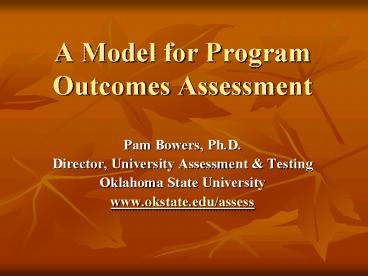A Model for Program Outcomes Assessment - PowerPoint PPT Presentation
1 / 23
Title:
A Model for Program Outcomes Assessment
Description:
... for Program Outcomes Assessment. Pam Bowers, ... Program outcomes assessment ... Do results indicate achievement of learning outcomes as expected by faculty? ... – PowerPoint PPT presentation
Number of Views:117
Avg rating:3.0/5.0
Title: A Model for Program Outcomes Assessment
1
A Model for Program Outcomes Assessment
- Pam Bowers, Ph.D.
- Director, University Assessment Testing
- Oklahoma State University
- www.okstate.edu/assess
2
Identify Outcomes
Improve Program
Relate To Program
Assess
Where Assess?
Identify or develop Tool (exam, rubric)
How Assess?
Who Evaluates?
3
Identify Outcomes
4
Identify Outcomes
Relate To Program
5
Student Learning Outcomes
- Describe knowledge, skills, attitude
- this is what is assessed in program outcomes
assessment - Can be mapped to curriculum
- Measureable
- students must be able to demonstrate learning in
a way that can be assessed
6
Example Graduates will be able to communicate
effectively in writing
- Describe knowledge, skills, attitude
- students will be able to
- Can be mapped to curriculum
- writing assignments throughout program provide
opportunities for increasing knowledge/improving
skills
7
Identify Outcomes
Relate To Program
Where Assess?
8
When / How to Assess
- Can be mapped to curriculum
- What courses/experiences contribute most to this
knowledge/skill? - Measureable students demonstrate learning in
ways that can be assessed - What assignments/activities demonstrate student
achievement of this outcome? - (papers, projects, exams, portfolio artifacts)
9
Identify Outcomes
Relate To Program
Where Assess?
How Assess?
10
When / How to Assess
- What context provides best opportunity for
measurement? - capstone course, internship, certification
process - What assignments or program experiences best
demonstrate student achievement of the learning
outcome? - capstone course project, licensure exam,
internship evaluation
11
Identify Outcomes
Relate To Program
Where Assess?
How Assess?
Who Evaluates?
12
Who conducts the assessment?
- Who provides valid, reliable measure of student
achievement of the learning outcome being
assessed? - program faculty
- testing center
- external reviewer
- internship supervisor
- Consider ease of administration, cost
effectiveness, credibility
13
Identify Outcomes
Relate To Program
Where Assess?
Identify or develop Tool (exam, rubric)
How Assess?
Who Evaluates?
14
Identify or develop assessment tool
- What characteristics/criteria define
achievement of the learning outcome? - What work/activity (assignment(s), exam(s),
internship) requires students to demonstrate
expected skills/knowledge/attitudes? - How can work be evaluated to provide useful
information for program improvement? - What data is provided by this evaluation?
- areas of strength/weakness, overall achievement
15
Identify Outcomes
Relate To Program
Assess
Where Assess?
Identify or develop Tool (exam, rubric)
How Assess?
Who Evaluates?
16
Conducting the Assessment
- Program outcomes assessment
- timing when in the program will students have
maximum achievement of this outcome? - Representative sample
- results will be most useful for program
improvement if representative of all grads - Systematic data collection process
- reliable, valid evaluation method
- qualified/trained evaluators
- provides data indicating areas of strengths and
weaknesses in student learning (all students)
17
- An approximate answer to the right question is
worth a good deal more than an exact answer to an
approximate question.' - --a paraphrase of J. W. Tukey (1962)
18
Example Method Measure studentsability to
communicate effectively in writing by evaluating
students work using a faculty developed rubric.
- Work to be evaluated selected writing
assignment in capstone course, or
theses/dissertations (toward program end) - Sample all seniors or random sample
- Tool faculty designed rubric - evaluation
criteria are defined by faculty (validity) - Evaluators trained faculty or external reviewers
(reliability) - Data provided scores on criteria indicating
students learning strengths/weaknesses
19
Identify Outcomes
Improve Program
Relate To Program
Assess
Where Assess?
Identify or develop Tool (exam, rubric)
How Assess?
Who Evaluates?
20
Use Results to Improve
- Do results indicate achievement of learning
outcomes as expected by faculty? - How will faculty use results for program
improvement? - Changes to focus on strengths?
- Changes to improve learning in weaker areas?
- Improve/change assessment methods?
- Modify Expected Program Learning Outcomes?
21
Identify Outcomes
Improve Program
Relate To Program
Assess
Where Assess?
Identify or develop Tool (exam, rubric)
How Assess?
Who Evaluates?
22
Identify Outcomes
Improve Program
Relate To Program
Assess
Where Assess?
Identify or develop Tool (exam, rubric)
How Assess?
Who Evaluates?
23
- In God we trust
- all others bring data.
- Margaret Spellings
- U.S. Secretary of Education































